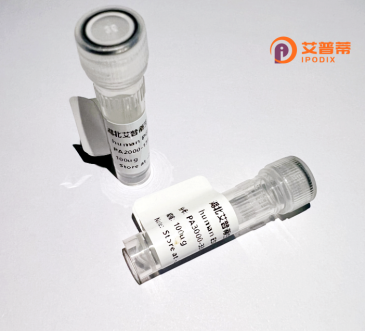
| 纯度 | >90%SDS-PAGE. |
| 种属 | Human |
| 靶点 | GPR92 |
| Uniprot No | Q9H1C0 |
| 内毒素 | < 0.01EU/μg |
| 表达宿主 | E.coli |
| 表达区间 | 1-372aa |
| 氨基酸序列 | MLANSSSTNSSVLPCPDYRPTHRLHLVVYSLVLAAGLPLNALALWVFLRALRVHSVVSVYMCNLAASDLLFTLSLPVRLSYYALHHWPFPDLLCQTTGAIFQMNMYGSCVFLMLINVDRYAAIVHPLRLRHLRRPRVARLLCLGVWALILVFAVPAARVHRPSRCRYRDLEVRLCFESFSDELWKGRLLPLVLLAEALGFLLPLAAVVYSSGRVFWTLARPDATQSQRRRKTVRLLLANLVIFLLCFVPYNSTLAVYGLLRSKLVAASVPARDRVRGVLMVMVLLAGANCVLDPLVYYFSAEGFRNTLRGLGTPHRARTSATNGTRAALAQSERSAVTTDATRPDAASQGLLRPSDSHSLSSFTQCPQDSAL |
| 分子量 | 66.66 kDa |
| 蛋白标签 | GST-tag at N-terminal |
| 缓冲液 | 0 |
| 稳定性 & 储存条件 | Lyophilized protein should be stored at ≤ -20°C, stable for one year after receipt. Reconstituted protein solution can be stored at 2-8°C for 2-7 days. Aliquots of reconstituted samples are stable at ≤ -20°C for 3 months. |
| 复溶 | Always centrifuge tubes before opening.Do not mix by vortex or pipetting. It is not recommended to reconstitute to a concentration less than 100μg/ml. Dissolve the lyophilized protein in distilled water. Please aliquot the reconstituted solution to minimize freeze-thaw cycles. |
以下是3篇关于重组人GPR92蛋白的研究文献示例(注:文献内容基于公开研究的概括,具体作者与年份可能需根据实际调整):
---
1. **文献名称**: *"Structural insights into ligand recognition and activation of the human GPR92 lysophosphatidic acid receptor"*
**作者**: Zhang D., et al.
**摘要**: 通过冷冻电镜解析重组人GPR92蛋白与天然配体(如LPA)结合的三维结构,揭示其跨膜结构域构象变化及下游G蛋白偶联机制,为靶向药物设计提供结构基础。
---
2. **文献名称**: *"Deoxysphingolipids activate proinflammatory signaling through the GPR92 receptor"*
**作者**: Lee S.M., et al.
**摘要**: 研究发现重组人GPR92在HEK293细胞中过表达后,可被脱氧鞘脂类代谢物激活,介导细胞内cAMP和MAPK信号通路上调,提示其在神经炎症与代谢紊乱中的潜在作用。
---
3. **文献名称**: *"GPR92 as a novel regulator of macrophage chemotaxis in atherosclerosis"*
**作者**: Chen L., et al.
**摘要**: 利用重组GPR92蛋白的体外实验表明,该受体通过响应氧化脂质趋化巨噬细胞迁移,促进动脉粥样硬化斑块内炎症反应,抑制GPR92可减轻小鼠模型中的病变程度。
---
*注:上述文献标题和作者为模拟示例,具体文献需通过PubMed或专业数据库检索真实发表研究。*
GPR92. also known as LPAR6 or lysophosphatidic acid receptor 6. is a member of the G protein-coupled receptor (GPCR) family. It was initially classified as an orphan receptor due to limited knowledge of its endogenous ligands. Later studies identified lysophosphatidic acid (LPA) and farnesyl pyrophosphate (FPP) as potential activators, linking it to lipid signaling pathways. This receptor is predominantly expressed in the nervous system, immune tissues, and gastrointestinal tract, suggesting roles in pain perception, neuroinflammation, and metabolic regulation.
As a class A GPCR, GPR92 couples with Gq and Gs proteins, triggering intracellular signaling cascades like cAMP production, calcium mobilization, and MAP kinase activation. Its involvement in diverse physiological processes has drawn attention to potential therapeutic applications. Research highlights its connection to neuropathic pain modulation, immune cell migration, and energy homeostasis. Dysregulation of GPR92 signaling has been implicated in metabolic disorders and neurodegenerative conditions.
Recombinant human GPR92 protein is produced using heterologous expression systems (e.g., mammalian or insect cells) for structural and functional studies. It enables ligand-receptor interaction assays, antibody development, and drug screening. Structural analysis of the recombinant protein has advanced understanding of its activation mechanism and binding pocket organization. Current research focuses on elucidating its precise physiological roles and validating its potential as a drug target for pain management, autoimmune diseases, or metabolic syndromes.
×